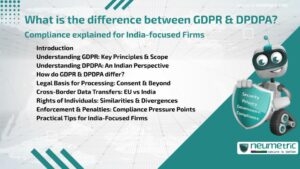Table of Contents
ToggleIntroduction
In the fast-paced landscape of e-commerce, where convenience & efficiency intersect with digital transactions, the need for robust cybersecurity measures has never been more pronounced. As the global reliance on online shopping continues to surge, so too does the sophistication of cyber threats. This necessitates an intricate & comprehensive approach to cybersecurity in the realm of e-commerce.
Cybersecurity in e-commerce refers to the comprehensive set of practices, technologies & measures implemented to protect online businesses, their customers & digital transactions from cyber threats. As the e-commerce landscape continues to grow, so do the risks associated with cyberattacks, including data breaches, financial fraud & disruptions to business operations. Effective cybersecurity strategies in e-commerce aim to safeguard sensitive information, ensure the integrity of online transactions & maintain the trust of customers in the digital marketplace.
Beyond the fundamental principles of secure payment gateways, data encryption & multi-factor authentication, this expanded exploration delves into additional layers of defence. From advanced fraud prevention mechanisms to the intricacies of securing mobile transactions, each facet contributes to a fortified cybersecurity framework, essential for safeguarding both businesses & the sensitive information of discerning online shoppers.
Ways to enhance e-commerce security for Ecommerce
- Secure payment gateways: Implementing secure & trusted payment gateways is fundamental for protecting financial transactions. Encryption protocols, such as SSL/TLS, ensure that customer payment details are transmitted securely over the internet, preventing interception by malicious actors.
- Data encryption & tokenization: Encrypting sensitive data, including customer information & payment details, adds an extra layer of protection. Tokenization replaces sensitive data with unique tokens, reducing the risk associated with storing & transmitting confidential information.
- Multi-factor authentication [MFA]: MFA enhances the security of user accounts by requiring multiple forms of verification. This additional layer of authentication, beyond passwords, helps prevent unauthorised access, especially to customer accounts containing personal & financial information.
- Regular security audits & vulnerability assessments: Conducting regular security audits & vulnerability assessments helps identify & address potential weaknesses in the e-commerce infrastructure. This proactive approach allows businesses to stay ahead of emerging threats & fortify their security measures.
- Employee training & awareness: Human error is one of the significant factors in cybersecurity incidents. Comprehensive training programs ensure that employees are aware of cybersecurity best practices, recognize phishing attempts & understand their role in maintaining a secure online environment.
- Incident response plan: Developing a robust incident response plan is crucial for minimising the impact of a cyber incident. This plan outlines the steps to be taken in the event of a security breach, ensuring a swift & coordinated response to mitigate damage & protect customer data.
Secure e-commerce transactions:
Ensuring cybersecurity in e-commerce goes beyond individual measures, it requires a comprehensive approach to protect both businesses & their customers from evolving threats. Here are additional aspects to consider:
- Fraud prevention mechanisms: Implementing advanced fraud prevention mechanisms, such as machine learning algorithms & behavioural analytics, adds an extra layer of security. These technologies can identify patterns indicative of fraudulent activities, providing real-time alerts & minimising financial risks.
- Dynamic security policies: Adopting dynamic security policies that adapt to changing cyber threats is essential. These policies should encompass real-time monitoring, anomaly detection & automatic adjustments to respond to emerging risks, ensuring a proactive defence against evolving attack vectors.
- Secure mobile transactions: With the rise of mobile commerce, securing transactions conducted through mobile devices is paramount. Implementing strong authentication methods, secure mobile apps & encryption for mobile transactions safeguards the growing number of consumers who prefer to shop through their smartphones & tablets.
- Supply chain security: Recognizing the interconnected nature of e-commerce, securing the entire supply chain is critical. Collaborating with suppliers, ensuring secure data exchange & conducting regular security assessments throughout the supply chain help prevent vulnerabilities that could be exploited by cybercriminals.
- Customer data privacy: Prioritising customer data privacy involves transparent data handling practices & compliance with privacy regulations. Providing clear privacy policies, obtaining explicit consent for data processing & giving customers control over their data contribute to a positive & secure online shopping experience.
- Continuous monitoring & threat intelligence: Continuous monitoring of network traffic & the adoption of threat intelligence tools enable e-commerce businesses to stay informed about emerging cyber threats. This proactive approach allows for timely responses to potential security incidents, reducing the impact of cyberattacks.
- Blockchain technology: Exploring the potential of blockchain technology in e-commerce can enhance security by providing a decentralised & tamper-resistant ledger. Blockchain can be applied to secure transactions, supply chain management & identity verification, offering a robust foundation for trust in online transactions.
Challenges of cybersecurity in e-commerce:
Securing e-commerce platforms is a perpetual challenge as the digital landscape evolves & cyber threats become increasingly sophisticated. Here are some prominent challenges faced by businesses in ensuring robust cybersecurity for e-commerce:
- Sophisticated cyber threats: Cybercriminals continuously refine their tactics, employing advanced techniques such as phishing, ransomware & malware to exploit vulnerabilities. Keeping pace with these evolving threats requires constant vigilance & adaptive cybersecurity strategies.
- Data breaches & customer trust: Data breaches pose a significant risk, potentially exposing sensitive customer information. The fallout from such breaches not only results in financial losses but also erodes customer trust. Rebuilding confidence after a data breach is a complex & time-consuming process for e-commerce businesses.
- Payment fraud & financial losses: E-commerce platforms are attractive targets for payment fraud, including credit card fraud & identity theft. The financial losses incurred by businesses due to fraudulent transactions, coupled with the associated chargeback costs, underscore the critical importance of effective fraud prevention measures.
- Supply chain vulnerabilities: The interconnected nature of e-commerce involves various partners & suppliers in the supply chain. Any vulnerabilities within this network can be exploited by cybercriminals to compromise the integrity of transactions, emphasising the need for comprehensive supply chain security.
- Compliance with evolving regulations: E-commerce businesses operate in a regulatory landscape that is constantly evolving. Ensuring compliance with data protection laws & industry standards poses a challenge, particularly for global enterprises navigating diverse & sometimes conflicting regulatory requirements.
- Securing mobile transactions: The surge in mobile commerce introduces additional challenges as transactions conducted through mobile devices become a target for cyber threats. Securing mobile applications, ensuring secure communication channels & protecting user credentials on mobile platforms are imperative yet intricate tasks.
- Insider threats & employee awareness: Insider threats, whether intentional or unintentional, can compromise e-commerce security. Employee awareness & training are crucial to prevent unintentional security breaches, while robust access controls are necessary to mitigate the risk of malicious insider activities.
- Scaling security measures: As e-commerce businesses scale & expand, the challenge lies in scaling security measures proportionately. Ensuring that security infrastructure, policies & practices can accommodate growth without sacrificing effectiveness is an ongoing challenge for rapidly expanding enterprises.
- User authentication & account takeovers: Cybercriminals often target user accounts through various methods, including credential stuffing & brute-force attacks. Strengthening user authentication mechanisms & implementing measures to detect & prevent account takeovers are essential for protecting customer accounts.
- Balancing security & user experience: Striking a balance between robust cybersecurity measures & a seamless user experience is challenging. Intrusive security measures may deter users, while lax security could expose the platform to vulnerabilities. Finding the right equilibrium is essential for ensuring both security & user satisfaction.
Role of cybersecurity in shaping the future of e-commerce:
As the landscape of e-commerce evolves, cybersecurity emerges as a pivotal force shaping its trajectory. The integration of robust cybersecurity measures not only addresses current challenges but also plays a crucial role in unlocking the full potential of the future of e-commerce. Here’s how cybersecurity is set to influence & enhance the future of online commerce:
- Trust & customer confidence: Cybersecurity remains the bedrock of trust in the digital marketplace. Establishing & maintaining a secure environment fosters customer confidence. In the future, as e-commerce expands into new markets & demographic segments, trust becomes a currency that directly influences consumer decisions & brand loyalty.
- Global expansion & compliance: As e-commerce ventures into global markets, diverse regulatory landscapes come into play. Robust cybersecurity practices ensure compliance with varying data protection & privacy regulations worldwide. This proactive approach not only mitigates legal risks but also facilitates seamless international expansion, providing a competitive edge for businesses operating on a global scale.
- Innovation & emerging technologies: The future of e-commerce is intertwined with innovation & emerging technologies. From artificial intelligence [AI] to blockchain, these technologies promise enhanced user experiences & operational efficiency. Cybersecurity acts as the guardian, ensuring the responsible adoption of these technologies by safeguarding against potential vulnerabilities & threats.
- Personalization & data protection: The future of e-commerce is characterised by hyper-personalization, with businesses leveraging data to tailor experiences for individual users. Cybersecurity plays a pivotal role in this era of data-driven personalization by protecting customer data against unauthorised access & ensuring ethical data handling practices. This balance fosters a personalised yet secure shopping experience.
- Continued rise of mobile commerce: Mobile commerce is on an upward trajectory, with a growing number of consumers relying on smartphones & tablets for their online shopping. Cybersecurity measures, specifically designed for mobile transactions, will be integral in securing these platforms. Future innovations may include advanced biometric authentication & secure mobile payment technologies to enhance security in the mobile e-commerce landscape.
- Augmented Reality [AR] & Virtual Reality [VR] security: The integration of AR & VR in e-commerce introduces new dimensions to the online shopping experience. Cybersecurity measures will be instrumental in protecting the integrity of AR & VR platforms, ensuring secure interactions & preventing potential risks associated with these immersive technologies.
- Supply chain security & resilience: Cybersecurity extends beyond individual e-commerce platforms to encompass the entire supply chain. The future will witness a heightened focus on securing the interconnected network of suppliers, distributors & partners. This comprehensive approach enhances the resilience of e-commerce ecosystems against disruptions & cyber threats originating from the supply chain.
- AI-driven cybersecurity defences: The future of e-commerce security will witness a greater reliance on AI-driven cybersecurity defences. Machine learning algorithms will analyse vast datasets in real-time, identifying patterns indicative of potential threats & autonomously adapting security measures. This proactive & adaptive approach is crucial in defending against evolving cyber threats.
- Environmental & ethical considerations: Beyond traditional security concerns, the future of e-commerce will also be influenced by environmental & ethical considerations. Cybersecurity measures will need to encompass responsible data usage, environmentally sustainable practices & ethical considerations in algorithmic decision-making, contributing to a more socially responsible digital commerce landscape.
Conclusion:
In summary, cybersecurity is not just a reactive defence mechanism but a proactive enabler of the future of e-commerce. By establishing trust, ensuring compliance, fostering innovation & addressing emerging challenges, cybersecurity is poised to play a central role in shaping the dynamic & resilient landscape of online commerce in the years to come. Safeguarding e-commerce transactions requires a multi-faceted cybersecurity strategy.
Incorporating advanced fraud prevention, dynamic security policies, secure mobile transactions, supply chain security, customer data privacy, continuous monitoring & exploring emerging technologies like blockchain collectively contribute to a resilient e-commerce security framework. As online businesses continue to evolve, so must their commitment to cybersecurity to protect both their interests & the trust of their customers in the digital marketplace.
In the coming years, the seamless integration of cutting-edge technologies, from artificial intelligence to augmented reality, will redefine the online shopping experience. However, the success of these innovations hinges on the foundation of robust cybersecurity measures.
FAQs:
Why is cybersecurity important in e-commerce?
Cybersecurity is crucial in e-commerce to protect sensitive customer information, secure financial transactions, prevent data breaches & maintain the trust of online shoppers. A breach can lead to financial losses, reputational damage & legal consequences.
How can e-commerce businesses protect against data breaches?
E-commerce businesses can protect against data breaches by implementing encryption, regularly auditing security measures, training employees on cybersecurity best practices & having a robust incident response plan in place.
What role does multi-factor authentication play in e-commerce security?
Multi-factor authentication adds an extra layer of security by requiring users to provide multiple forms of verification, such as a password & a temporary code sent to their mobile device. This helps prevent unauthorised access to customer accounts.
How often should e-commerce businesses conduct security audits?
E-commerce businesses should conduct regular security audits & vulnerability assessments, ideally at least annually or whenever there are significant changes to the e-commerce infrastructure. This helps identify & address potential security weaknesses.
What steps should be included in an incident response plan for e-commerce?
An incident response plan for e-commerce should include steps for detection, containment, eradication, recovery & communication. It should be regularly tested & updated to ensure an effective response to security incidents.





